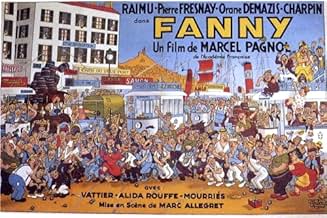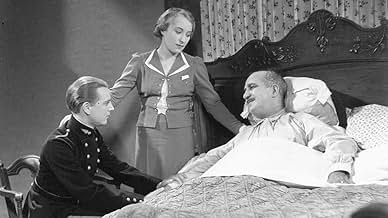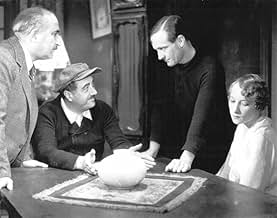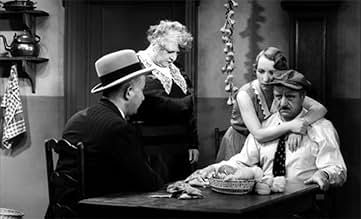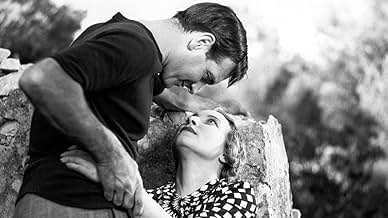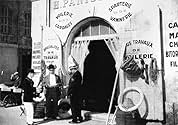After Fanny's boyfriend leaves her and sails away, she finds out she's pregnant.After Fanny's boyfriend leaves her and sails away, she finds out she's pregnant.After Fanny's boyfriend leaves her and sails away, she finds out she's pregnant.
Fernand Charpin
- Honore Panisse
- (as Charpin)
Auguste Mouriès
- Félix Escartefigue
- (as Mouriès)
Robert Vattier
- Albert Brun
- (as Vattier)
Édouard Delmont
- Dr. Felicien Venelle
- (uncredited)
Pierre Prévert
- Un voyageur du tramway
- (uncredited)
Annie Toinon
- Amélie
- (uncredited)
Featured reviews
Fanny (1932) :
Brief Review -
The best possible follow-up to Cult Classic 'Marius' and a highly sensitive content far ahead of its time. So this was exactly 37 years before Bollywood adopted this concept with "Ek Phool Do Mali" in 1969, which was considered ahead of its time due to the sensitivity of the topic then just imagine how far ahead Fanny was for its time? Truly unthinkable. And the maturity of this concept was beyond acceptance for 30s audience. French Cinema created a Classic Tear-jerker like 'Marius' (1931) but the way that film ends certainly gives a chance to a great follow-up which could have easily been predicted while watching Marius only. Fanny begins right where Marius ended as we see Fanny getting pregnant by Marius child after Marius had left to acquire his wild dreams. Panisse asks her to Marry him and promises to love the child like his own but things get messy as all of sudden Marius returns to visit the town for a short time of period. Okay, this was highly predictable and even the next things coming were pretty easy to predict or rather i would say things go exactly as you would have liked it to predict and therefore Fanny ends on an matured and fulfilling note. The problem here is, Fanny follows a Cult film which puts a lot of burden on it so obviously it stays behind its predecessor. The emotional quotient is not high when there was a potential for it and most importantly it doesn't make the characters look intellectual which it should have done considering their intellectual behaviour in the predecessor. However, for any Normal film it is overwhelming for sure. I dare everyone, beat the time limit of this content if you can. It was at least 2-3 decades ahead of its time for the impact in real life. Overall, its a deserving sequel which deserves individual love instead of underwhelming praise caused by comparison with its prequel.
RATING - 7.5/10*
By - #samthebestest
The best possible follow-up to Cult Classic 'Marius' and a highly sensitive content far ahead of its time. So this was exactly 37 years before Bollywood adopted this concept with "Ek Phool Do Mali" in 1969, which was considered ahead of its time due to the sensitivity of the topic then just imagine how far ahead Fanny was for its time? Truly unthinkable. And the maturity of this concept was beyond acceptance for 30s audience. French Cinema created a Classic Tear-jerker like 'Marius' (1931) but the way that film ends certainly gives a chance to a great follow-up which could have easily been predicted while watching Marius only. Fanny begins right where Marius ended as we see Fanny getting pregnant by Marius child after Marius had left to acquire his wild dreams. Panisse asks her to Marry him and promises to love the child like his own but things get messy as all of sudden Marius returns to visit the town for a short time of period. Okay, this was highly predictable and even the next things coming were pretty easy to predict or rather i would say things go exactly as you would have liked it to predict and therefore Fanny ends on an matured and fulfilling note. The problem here is, Fanny follows a Cult film which puts a lot of burden on it so obviously it stays behind its predecessor. The emotional quotient is not high when there was a potential for it and most importantly it doesn't make the characters look intellectual which it should have done considering their intellectual behaviour in the predecessor. However, for any Normal film it is overwhelming for sure. I dare everyone, beat the time limit of this content if you can. It was at least 2-3 decades ahead of its time for the impact in real life. Overall, its a deserving sequel which deserves individual love instead of underwhelming praise caused by comparison with its prequel.
RATING - 7.5/10*
By - #samthebestest
10rsoonsa
FANNY is the second film of a trilogy, based upon a play by Marcel Pagnol, from which all three works are taken, featuring most of the cast of excellent actors which made the stage original a great artistic and popular success, including Raimu, Charpin, Pierre Fresnay, and Orane Demazis as Fanny, an assemblage which remains faithful to the heart of the original. By repudiating the normal placement of concurrent French films made in Parisian studios, and producing the work in his native Marseilles, in Provence, Pagnol achieves a finely-hewn naturalism which is very congenial to the scenario, dealing as it does with a hard-working bourgeoisie whose lives are in concert with rhythms of a major seaport. Fanny's passionate attention to Marius (Fresnay) results in her pregnancy from their farewell coupling at the denouement of the first of the trilogy, MARIUS, with her lover falling prey to the lure of a seafaring life and she, abandoned, accepts a proposal of marriage from a much older M. Panisse (Charpin), in order to save the reputation of her family. The love of Panisse for the child of Fanny is the moving force in what must be the inevitable fulfillment of the storyline, i.e., the return of Marius to claim his erstwhile fiancée and his true child in a scene which brings the best from Demazis, Fresnay, and Raimu as Cesar, the father of Marius and lifelong friend of Panisse. Pagnol directed only the finale of the trio, and selects for FANNY Marc Allegret, who leads the cast with distinction, displaying particular skill when allowing Pagnol's magnificent dialogue to be developed in what is essentially a filmed work for the stage, with few sets, and who allows liberal emphasis upon the plastic Raimu, who is, after all, the most important presence in this romantic masterpiece.
This is the second of the three part "Fanny Trilogy" by the French writer, Marcel Pagnol. Originally, they were a stage play, then a movie and then many years later in 1961, the three movies were combined to make one movie named FANNY. I've always loved the 1961 movie, so I was thrilled to see the original three movies--all part of a 4 disk set by Kino Video.
Throughout much of the 1932 movie, the lines were identical or very close to the 1961 film. Of the three movies, I think this one is closest to the 1961 film except that this one is in French with subtitles and is black and white. The 1961 version is simply a lot prettier--with great music, lighting, and acting. The earlier version, though wonderful, is a little more flat. Not bad--in fact, very good,...just kind of flat in comparison. If you only have the patience, see the 1961 combined film. If you are a cinephile, then see all of the films--the writing by Pagnol is amazing.
Throughout much of the 1932 movie, the lines were identical or very close to the 1961 film. Of the three movies, I think this one is closest to the 1961 film except that this one is in French with subtitles and is black and white. The 1961 version is simply a lot prettier--with great music, lighting, and acting. The earlier version, though wonderful, is a little more flat. Not bad--in fact, very good,...just kind of flat in comparison. If you only have the patience, see the 1961 combined film. If you are a cinephile, then see all of the films--the writing by Pagnol is amazing.
"Fanny", the second chapter of Marcel Pagnol's 'Marseilles' trilogy, takes us right to the spot the first movie ended. There's no summary, no flashbacks, no flash forward either, it's just as if the director, Marc Allegret trusted the good memory of his audience, and I guess in these times, cinema was still such a new thing that an experience like the first "Marius" would have left unforgettable memories.
Marius (Pierre Fresnay), the idealistic and romantic son of colorful barkeeper César (the one and only Raimu), has just sailed to the seven seas, following both his lifelong dream and the guidance of his beloved Fanny (Orane Demazis). We left César delighted after hearing that his son and Fanny would marry, and give him grandchildren in the years to come. But "Fanny" starts with Marius' departure. And you can see the light of joy vanish from César's face, he welcomes the news like a knife in his heart and sinks into melancholy like an ice cube in a Pastis drink. The first act shows both César and Fanny trying to deal with Marius' absence, their deep and inconsolable sorrow makes Marius the most present character despite his absence.
But the worst is yet to come, Fanny is pregnant and Marius is the father. Her mother Honorine throws a tantrum and was about to disown her when she passed out, that's the kind of blow to their honor they don't need in the family. The situation seems unsolvable but there's a gateway: brave old Panisse (Henri Charpin) who's still maintaining his offer to marry Fanny. What I liked about the film is that you kind of secrecy to run in the narrative, but it doesn't, for one simple reason, this is a film with fully developed characters. Their personality are not reliant on the plot, they make the plot. Fanny is not a bad woman, when Panisse proposes her, she can't hide her pregnancy, because lying would be more dishonorable. And I loved Panisse's response, he's aware that their age gap will inspire a lot of gossipy talks, but he's always wanted to be a father, so his marriage with Fanny is benefiting for both, it's a win-win situation.
Any ounce of guilt or discomfort is dissipated; by marrying Fanny, Panisse keeps her honor and his self-esteem.. It is a marriage of convenience but Panisse makes good points, what's more, he's rich, so Fanny doesn't have much a choice, between a bastard and a rich heir. But here 's how the film teases your expectations again, just when you're wondering how they'll keep the secret, César does his best keeping Fanny's spirit up confident that Marius will come back, and does his best keeping Panisse away from her, dismissing his idea of marrying her. In a lesser movie, Fanny would have held the truth and César would have called her as a whore or a venal woman, but Fanny can't stand the insult and asks Panisse to reveal their secret. It takes a few minutes but César realizes they do have a point and waiting for Marius would bring dishonor for poor Fanny. But he also looks at the bright side of things, he'll still have a grandson and a heir, the name doesn't matter, he'd be twice wealthier.
There's a poignant scene where the older man of Panisse family thanks Fanny for the baby and at this point, there's no way you'd believe they did something wrong. It is a win-win indeed and a fragile equilibrium is reached until Marius comes back. And again, Fanny tells him the truth Panisse can let Fanny go back to Marius but he won't abandon his child and even César, César who had always put his son above any other man, who had a nasty quarrel with Panisse, defended him. What a climax! You have plenty of characters with desires and dreams colliding together, Marius' love for Fanny, Fanny's honor, Panisse needing a child, César for a grandson to play with, each one is right, but they can't all be satisfied, even Fanny can't abandon Panisse despite the fact that she loves Marius. It's pure Cornelian dilemmas and it works on a very emotional and realistic level, not resorting to the clichés or "idiot script" formula where it's more convenient to keep a mystery, the film doesn't care for mysteries, it cares about people who're so passionate, so involved that they end up knowing what the others were about to hide. Like life I guess, you can't have secrets for too long.
The film was directed by another director but the continuity with the first film is so well-done you'd think it was made by the same person. Well, the film is based on Marcel Pagnol's play and he's the real "director" and the actors are so into their characters that they make any directorial stunt unnecessary, it's a character-study, a story of people driven to the most extreme compromises by their morals, feelings and duties, to keep the appearances. The film ends with its bleak note, leaving us eager to look forward to a suitable conclusion, this time named "César" and directed by Marcel Pagnol himself.
Needless to say, I'm looking forward to discovering it
Marius (Pierre Fresnay), the idealistic and romantic son of colorful barkeeper César (the one and only Raimu), has just sailed to the seven seas, following both his lifelong dream and the guidance of his beloved Fanny (Orane Demazis). We left César delighted after hearing that his son and Fanny would marry, and give him grandchildren in the years to come. But "Fanny" starts with Marius' departure. And you can see the light of joy vanish from César's face, he welcomes the news like a knife in his heart and sinks into melancholy like an ice cube in a Pastis drink. The first act shows both César and Fanny trying to deal with Marius' absence, their deep and inconsolable sorrow makes Marius the most present character despite his absence.
But the worst is yet to come, Fanny is pregnant and Marius is the father. Her mother Honorine throws a tantrum and was about to disown her when she passed out, that's the kind of blow to their honor they don't need in the family. The situation seems unsolvable but there's a gateway: brave old Panisse (Henri Charpin) who's still maintaining his offer to marry Fanny. What I liked about the film is that you kind of secrecy to run in the narrative, but it doesn't, for one simple reason, this is a film with fully developed characters. Their personality are not reliant on the plot, they make the plot. Fanny is not a bad woman, when Panisse proposes her, she can't hide her pregnancy, because lying would be more dishonorable. And I loved Panisse's response, he's aware that their age gap will inspire a lot of gossipy talks, but he's always wanted to be a father, so his marriage with Fanny is benefiting for both, it's a win-win situation.
Any ounce of guilt or discomfort is dissipated; by marrying Fanny, Panisse keeps her honor and his self-esteem.. It is a marriage of convenience but Panisse makes good points, what's more, he's rich, so Fanny doesn't have much a choice, between a bastard and a rich heir. But here 's how the film teases your expectations again, just when you're wondering how they'll keep the secret, César does his best keeping Fanny's spirit up confident that Marius will come back, and does his best keeping Panisse away from her, dismissing his idea of marrying her. In a lesser movie, Fanny would have held the truth and César would have called her as a whore or a venal woman, but Fanny can't stand the insult and asks Panisse to reveal their secret. It takes a few minutes but César realizes they do have a point and waiting for Marius would bring dishonor for poor Fanny. But he also looks at the bright side of things, he'll still have a grandson and a heir, the name doesn't matter, he'd be twice wealthier.
There's a poignant scene where the older man of Panisse family thanks Fanny for the baby and at this point, there's no way you'd believe they did something wrong. It is a win-win indeed and a fragile equilibrium is reached until Marius comes back. And again, Fanny tells him the truth Panisse can let Fanny go back to Marius but he won't abandon his child and even César, César who had always put his son above any other man, who had a nasty quarrel with Panisse, defended him. What a climax! You have plenty of characters with desires and dreams colliding together, Marius' love for Fanny, Fanny's honor, Panisse needing a child, César for a grandson to play with, each one is right, but they can't all be satisfied, even Fanny can't abandon Panisse despite the fact that she loves Marius. It's pure Cornelian dilemmas and it works on a very emotional and realistic level, not resorting to the clichés or "idiot script" formula where it's more convenient to keep a mystery, the film doesn't care for mysteries, it cares about people who're so passionate, so involved that they end up knowing what the others were about to hide. Like life I guess, you can't have secrets for too long.
The film was directed by another director but the continuity with the first film is so well-done you'd think it was made by the same person. Well, the film is based on Marcel Pagnol's play and he's the real "director" and the actors are so into their characters that they make any directorial stunt unnecessary, it's a character-study, a story of people driven to the most extreme compromises by their morals, feelings and duties, to keep the appearances. The film ends with its bleak note, leaving us eager to look forward to a suitable conclusion, this time named "César" and directed by Marcel Pagnol himself.
Needless to say, I'm looking forward to discovering it
I have just finished watching Proof, a film released in the year of our Lord, 2005, which is adapted from a stage play in which the director has gone to great pains to hide the fact that his work is based on the play. flash back 70 years and we have a movie made that looks like a filmed stage play with real locations replacing the stage sets. All early sound movies feel set-locked as people talk and deliver within the range of the camera. Therefore, to hold the interest to the modern viewer, the dialogue and acting must be believable and engaging. The film fails to achieve it for the most part because the performance of the actress playing Fanny is a total success even though she was reprising her role from the stage. First time director, Pagnol adapting his own stage works suffers from a non-visual eye. The delight, is French star Raimu who delivers a performance still worthy to the eye even today. There is a reason Orson Welles called him a genius. The melodramatic plot of a scorned, (maybe that is too strong a word: even abandoned is too strong because she never lets on to her man that she does not want him to leave) woman who is pregnant is passé though common in the literature of the period. I remember a tracking shot that impressed me as the camera follows Fanny through the streets as she suspects she is pregnant. In the way it is handled and executed, it is cinematic authorship at its finest. It is a film in the middle of the trilogy, therefore there are loose ends left to be resolved. All movies are time capsules, it is said, therefore approach this with the right attitude and you might be rewarded.
Did you know
- TriviaFamed restaurateur and founder of California cuisine, Alice Waters, was so taken with the Fanny trilogy that she named her Berkeley restaurant Chez Panisse. The café upstairs from the restaurant is decorated with posters from the films Marius, Fanny, and César. Waters also named her own daughter Fanny and opened a small breakfast café in Berkeley called "Café Fanny" in 1984 which closed in March 2012.
- ConnectionsEdited into Histoire(s) du cinéma: Une histoire seule (1989)
- How long is Fanny?Powered by Alexa
Details
Box office
- Gross US & Canada
- $8,262
- Opening weekend US & Canada
- $7,720
- Jan 8, 2017
- Gross worldwide
- $8,262
- Runtime2 hours 20 minutes
- Color
- Aspect ratio
- 1.20 : 1
Contribute to this page
Suggest an edit or add missing content



